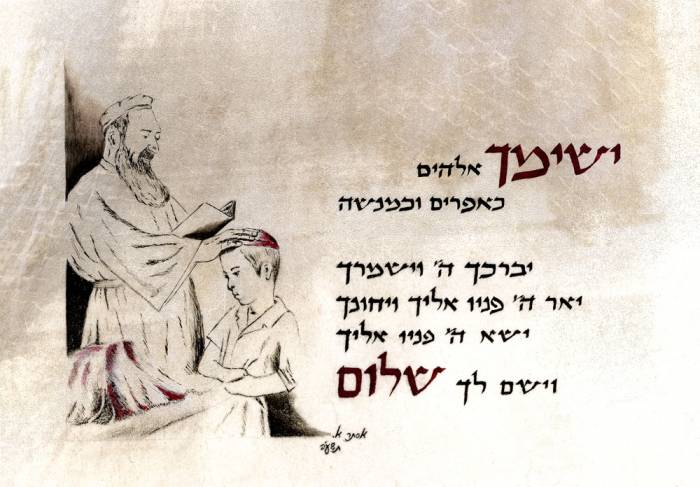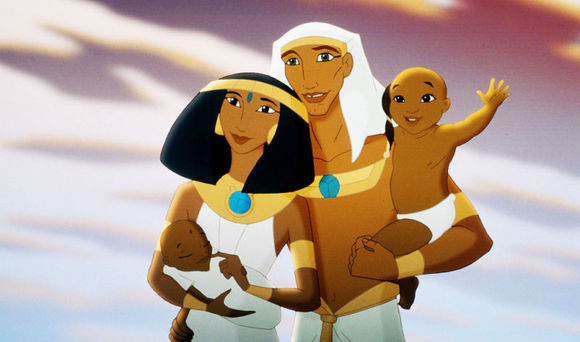Two Opposed Forces

Shalom,
There is a custom for the parents to bless their children on every Friday night as the family gathers together for Kiddush.
The words of the blessing are taken from the priestly blessing ברכת כוהנים (Numbers 6:24-26) and the introduction is altered depending on whether the child being blessed is a boy or girl.
For boys, the introduction is:
May you be like Ephraim and Menashe.
יְשִׂימְךָ אֱלהיִם כְּאֶפְרַיְם וְכִמְנַשֶּׁה
For girls, the introductory line is:
May you be like Sarah, Rebecca, Rachel, and Leah.
יְשִׂימֵךְ אֱלהיִם כְּשָׂרָה רִבְקָה רָחֵל וְלֵאָה
For both boys and girls, the rest of the blessing is (as quoted from the priestly blessing):
May God bless you and guard you
יְבָרֶכְךָ יְהוָה וְיִשְׁמְרֶךָ
May God show you favor and be gracious to you
יָאֵר יְהוָה פָּנָיו אֵלֶיךָ וִיחֻנֶּךָּ
May God show you kindness and grant you peace
יִשָּׂא יְהוָה פָּנָיו אֵלֶיךָ וְיָשֵׂם לְךָ שָׁלום
We would like to pay attention to the introductory line for boys as it is connected to the Torah portion ‘Va’Yechee’ which we will read this Saturday.
May you be like Ephraim and Menashe.
יְשִׂימְךָ אֱלהיִם כְּאֶפְרַיְם וְכִמְנַשֶּׁה
Question: Manasseh was Joseph’s first-born.
Why is Ephraim mentioned before him in this line?
Let us see how this line was origiated.
Following is the description of Jacob’s blessings to his grandchildren Ephraim and Manasseh (Gen. 28, 13:20)
וַיִּקַּח יוֹסֵף, אֶת-שְׁנֵיהֶם–אֶת-אֶפְרַיִם בִּימִינוֹ מִשְּׂמֹאל יִשְׂרָאֵל, וְאֶת-מְנַשֶּׁה בִשְׂמֹאלוֹ מִימִין יִשְׂרָאֵל; וַיַּגֵּשׁ, אֵלָיו
And Joseph took them both, Ephraim in his right hand toward Israel’s left hand, and Manasseh in his left hand toward Israel’s right hand, and brought them near unto him
וַיִּשְׁלַח יִשְׂרָאֵל אֶת-יְמִינוֹ וַיָּשֶׁת עַל-רֹאשׁ אֶפְרַיִם, וְהוּא הַצָּעִיר
וְאֶת-שְׂמֹאלוֹ, עַל-רֹאשׁ מְנַשֶּׁה: שִׂכֵּל, אֶת-יָדָיו, כִּי מְנַשֶּׁה, הַבְּכוֹר
And Israel stretched out his right hand, and laid it upon Ephraim’s head, who was the younger, and his left hand upon Manasseh’s head, guiding his hands wittingly; for Manasseh was the first-born
וַיְבָרֶךְ אֶת-יוֹסֵף, וַיֹּאמַר: הָאֱלֹהִים אֲשֶׁר הִתְהַלְּכוּ אֲבֹתַי לְפָנָיו אַבְרָהָם וְיִצְחָק–הָאֱלֹהִים הָרֹעֶה אֹתִי, מֵעוֹדִי עַד-הַיּוֹם הַזֶּה
And he blessed Joseph, and said: ‘The God before whom my fathers Abraham and Isaac did walk, the God who hath been my shepherd all my life long unto this day
הַמַּלְאָךְ הַגֹּאֵל אֹתִי מִכָּל-רָע, יְבָרֵךְ אֶת-הַנְּעָרִים, וְיִקָּרֵא בָהֶם שְׁמִי
וְשֵׁם אֲבֹתַי אַבְרָהָם וְיִצְחָק; וְיִדְגּוּ לָרֹב, בְּקֶרֶב הָאָרֶץ
The angel who hath redeemed me from all evil, bless the lads; and let my name be named in them, and the name of my fathers Abraham and Isaac; and let them grow into a multitude in the midst of the earth
וַיַּרְא יוֹסֵף, כִּי-יָשִׁית אָבִיו יַד-יְמִינוֹ עַל-רֹאשׁ אֶפְרַיִם–וַיֵּרַע בְּעֵינָיו
וַיִּתְמֹךְ יַד-אָבִיו, לְהָסִיר אֹתָהּ מֵעַל רֹאשׁ-אֶפְרַיִם–עַל-רֹאשׁ מְנַשֶּׁה
And when Joseph saw that his father was laying his right hand upon the head of Ephraim, it displeased him, and he held up his father’s hand, to remove it from Ephraim’s head unto Manasseh’s head
וַיֹּאמֶר יוֹסֵף אֶל-אָבִיו, לֹא-כֵן אָבִי: כִּי-זֶה הַבְּכֹר, שִׂים יְמִינְךָ עַל-רֹאשׁוֹ
And Joseph said unto his father: ‘Not so, my father, for this is the first-born; put thy right hand upon his head
וַיְמָאֵן אָבִיו, וַיֹּאמֶר יָדַעְתִּי בְנִי יָדַעְתִּי–גַּם-הוּא יִהְיֶה-לְּעָם, וְגַם-הוּא
יִגְדָּל; וְאוּלָם, אָחִיו הַקָּטֹן יִגְדַּל מִמֶּנּוּ, וְזַרְעוֹ, יִהְיֶה מְלֹא-הַגּוֹיִם
And his father refused, and said: ‘I know it, my son, I know it; he also shall become a people, and he also shall be great; howbeit his younger brother shall be greater than he, and his seed shall become a multitude of nations
וַיְבָרְכֵם בַּיּוֹם הַהוּא, לֵאמוֹר, בְּךָ יְבָרֵךְ יִשְׂרָאֵל לֵאמֹר
יְשִׂמְךָ אֱלֹהִים כְּאֶפְרַיִם וְכִמְנַשֶּׁה
וַיָּשֶׂם אֶת-אֶפְרַיִם, לִפְנֵי מְנַשֶּׁה
And he blessed them that day, saying: ‘By thee shall Israel bless, saying:
God make thee as Ephraim and as Manasseh.
(This is the intro line for boys’ blessing)
And he set Ephraim before Manasseh
One can see that there was a dramatic moment, when Joseph tried to make the blessing “right” by putting Jacob’s right hand on Manasseh’s head (since he was the first-born – בכור, and deserved to be blessed using the more important right hand) and Jacob’s left hand on Ephraim’s head (since he was the younger one).
However, Jacob refused, pronouncing the younger brother Ephraim to become greater than the first-born Manasseh.
Let us now look into the Hebrew names Ephraim – אפרים
And Manasseh – מנשה and their meanings.
We will recall now that Joseph named his sons for certain reasons. (Gen 41, 50:52)
לְיוֹסֵף יֻלַּד שְׁנֵי בָנִים, בְּטֶרֶם תָּבוֹא שְׁנַת הָרָעָב, אֲשֶׁר יָלְדָה-לּוֹ אָסְנַת, בַּת-פּוֹטִי פֶרַע כֹּהֵן אוֹן
And unto Joseph were born two sons before the year of famine came, whom Asenath the daughter of Poti-phera priest of On bore unto him
וַיִּקְרָא יוֹסֵף אֶת-שֵׁם הַבְּכוֹר, מְנַשֶּׁה: כִּי-נַשַּׁנִי אֱלֹהִים אֶת-כָּל-עֲמָלִי, וְאֵת כָּל-בֵּית אָבִ
And Joseph called the name of the first-born Manasseh: ‘for God hath made me forget all my toil, and all my father’s house
וְאֵת שֵׁם הַשֵּׁנִי, קָרָא אֶפְרָיִם: כִּי-הִפְרַנִי אֱלֹהִים, בְּאֶרֶץ עָנְיִי
And the name of the second called he Ephraim: ‘for God hath made me fruitful in the land of my affliction
Manasseh – מנשה has the root ‘נשה’ – ‘being forgotten’
Ephraim – אפרים has the root ‘פרה’ – ‘being fruitful’
Joseph’s children we born under the same circumstances in Egypt, after Joseph became second to Pharaoh.
Yet, the first one was called after the sorrow and bad reminiscences of Joseph’s past while the younger was called after the gratitude and optimism.
Thus, we may assume that Manasseh and Ephraim actually represent two opposite virtues or internal forces that every human being has within him.
One is relating to (or sometimes getting soaked by) the negative side of the circumstances, and the other is looking on the brighter aspect of those.
Thus, Ephraim – אפרים is the part of the personality which relates to the bright aspect and Manasseh – מנשה is the part that relates to the negativity.
Jacob recognized this fact, and, in spite of Manasseh being the first-born, preferred Ephraim to be greater than Manasseh, due to the bright outlook of things and the positive internal force his personality carried.
This is the reason that in the blessing we give our children, “Manasseh” is preceded by “Ephraim”, as Jacob stated it.
May you be like Ephraim and Menashe.
יְשִׂימְךָ אֱלהיִם כְּאֶפְרַיְם וְכִמְנַשֶּׁה
May we always put the bright side and the positive force of our personality before the dark and the negative one.
Shabbat Shalom,
Yoel & Orly
You can find our previous posts at:
https://www.ulpanor.com/category/newletter/
And, please feel free to distribute this newsletter via any channel you like.










